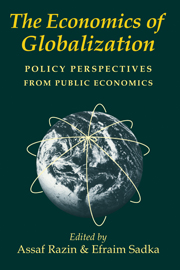Book contents
- Frontmatter
- Contents
- Preface
- List of Contributors
- Introduction
- I International Mobility of Technology
- II Capital Flows and Exchange-Rate Misalignment
- III Tax Incentives and Patterns of Capital Flows
- IV Limits to Income Redistribution in Federal Systems
- V Tax Harmonization, Tax Coordination, and the “Disappearing Taxpayer”
- VI Political-Economy Aspects of International Tax Competition
- 12 Factor Taxation, Income Distribution, and Capital-Market Integration
- 13 Interjurisdictional Tax Competition: A Political-Economy Perspective
- VII Migration of Skilled and Unskilled Labor
- VIII Fiscal Aspects of Monetary Unification
- Index
12 - Factor Taxation, Income Distribution, and Capital-Market Integration
Published online by Cambridge University Press: 28 January 2010
- Frontmatter
- Contents
- Preface
- List of Contributors
- Introduction
- I International Mobility of Technology
- II Capital Flows and Exchange-Rate Misalignment
- III Tax Incentives and Patterns of Capital Flows
- IV Limits to Income Redistribution in Federal Systems
- V Tax Harmonization, Tax Coordination, and the “Disappearing Taxpayer”
- VI Political-Economy Aspects of International Tax Competition
- 12 Factor Taxation, Income Distribution, and Capital-Market Integration
- 13 Interjurisdictional Tax Competition: A Political-Economy Perspective
- VII Migration of Skilled and Unskilled Labor
- VIII Fiscal Aspects of Monetary Unification
- Index
Summary
Introduction
Given the ongoing rapid integration of world capital markets and the expected fierce competition for internationally mobile capital, there have been surprisingly few changes in the overall tax treatment of capital income since the 1980s. Although many countries have reduced statutory tax rates on corporate and private capital income, tax bases have simultaneously been broadened, leading to only very moderate decreases in effective capital-tax rates for the Organization for Economic Cooperation and Development (OECD) average. Furthermore, there is no clear evidence that corporate taxes have converged over the years as a result of market forces. For the European Union (EU), the Ruding report (CEC, 1992, p. 12) states that most of the observed convergence has been “attributable to downward convergence of interest and inflation rates rather than deliberate action on the part of tax authorities.” Controlling for these factors, the cost of capital has actually risen in a number of EU countries, such as Denmark, Italy, The Netherlands, Spain, and the United Kingdom (CEC, 1992, table 8.19). A recent update that also incorporates other taxes (CEC, 1996) shows a somewhat clearer shift from capital to labor taxation in the EU average, but also reports exceptions to that general trend.
These mixed empirical findings contrast with the strong indication from economic theory that if the residence principle cannot be effectively enforced worldwide and if capital is perfectly mobile internationally, it is optimal for small countries to completely exempt capital income from taxes (Gordon, 1986; Razin and Sadka, 1991; Bucovetsky and Wilson, 1991).
- Type
- Chapter
- Information
- The Economics of GlobalizationPolicy Perspectives from Public Economics, pp. 267 - 290Publisher: Cambridge University PressPrint publication year: 1999



